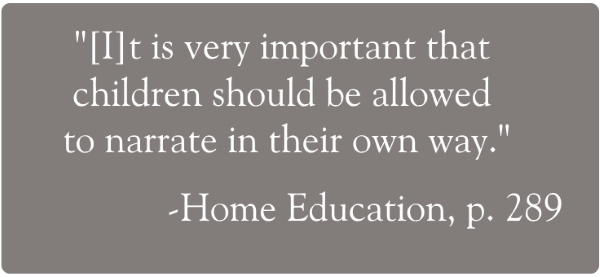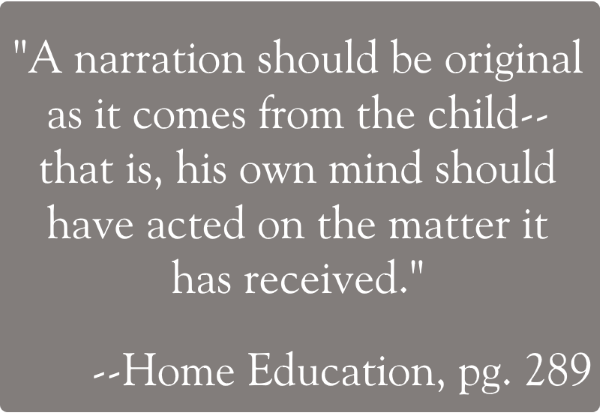
Homeschool teachers must consider many aspects of education beyond the books and pencils, especially with the Charlotte Mason method. This “shorts” episode includes three widely dispersed topics: the role of the “State,” sensations and feelings, and mottos.
Listen Now:

“…children are the property of the nation, to be brought up for the nation as is best for the nation, and not according to the whim of individual parents. The law is for the punishment of evil-doers, for the praise of them that do well [and, as an aside, that’s I Peter 2:14 she’s quoting there]; so, practically, parents have very free play; but it is as well we should remember that the children are a national trust whose bringing-up is the concern of all…” (1/6)
“The smallness of the family tends to obscure its character, and we see no force in the phrase [‘The family is the unit of the nation.’]; we do not perceive that, if the unit of the nation is the natural commune, the family; then, is the family pledged to carry on within itself all the functions of the State, with the delicacy, precision, and fulness of detail proper to work done on a small scale.” (2/5)
“The wonder that Almighty God can endure so far to leave the very making of an immortal being in the hands of human parents is only matched by the wonder that human parents can accept this divine trust with hardly a thought of its significance.” (1/333)
“…they are, like the bloom to the peach, the last perfection of a beautiful character; but when they become subjective, when every feeling concerns itself with the ego, we have, as in the case of sensations, morbid conditions set up; the person begins by being ‘over sensitive,’ hysteria supervenes, perhaps melancholia, an utterly spoilt life.” (2/295)
“…we perceive that the education we are giving exceeds all that we intended or imagined.” (3/148)
“…has had much effect in throwing children upon the possibilities, capabilities, duties and determining power belonging to them as persons.” (6/29)
“The P.U.S. motto, ‘ I am, I can, I ought, I will ‘, is known as the Augustine ladder. A ladder suggests a necessity to climb, and this ladder should help us in our efforts to achieve higher things. The first step of the ladder, ‘ I am ‘ reminds us of our responsibilities. Our conscious existence suggests all kinds of possibilities. This is our starting point. ‘ I can ‘ suggests an ideal. There may be a series of failures, but each effort should bring us a little nearer to the goal; we all can do a little, and *every mickle makes a muckle ‘. ‘ I ought *, which is sometimes put before ‘ I can ‘, is a twin to it, for what we ought to do we can do. ‘ I ought’ may suggest to us but cold duty. It might be an assistance if we thought of this step surrounded by a glowing halo, we would do better if we loved warmly what we ought to do. The story of Balaam in the Old Testament is an illustration of a man who did what he ought with his heart attached to that which was not permitted, and the end of the story shows us that his desire for wealth and worldly success was too strong, and his fall was inevitable. The last step, and likewise the most important, ‘ I will’, should be prefaced by the phrase ‘ by the Grace of God ‘ We are often too much inclined to feel that our strength is in ourselves, but St. Paul, in his letter to the Philippians, shows us the right view. ‘ Work out your own salvation with fear and trembling he says, and then adds, *It is God Who worketh in you, both to will and to do … ‘ We may not know what the will is, but we know what it does. It may be likened to a door-keeper letting in the guests. The door-keeper, having once let in the guests (ideas), has no further control over them. The more we consciously perform an act of will the stronger that will-power becomes….found in an old catechism book … I’m only one, but I am one; I can’t do everything, but I can do something. That which I do, I ought to do, and that which I ought to do, with God’s help so I will do” (THE P.U.S. MOTTO by Nancy Hatch (C.M.C.) PR 65, p. 68)
“I am told that we, as a society, are destined to live by our motto. … An inspiring motto must always be a power, but to live upon the good repute of our motto, and to live up to it and in it, are two different things, and I am afraid the Parents’ Union has much and continual thinking and strenuous living to face, if it proposes to stand before the world as interpreting and illustrating these ‘memorable words.’ But we are not a faint-hearted body; we mean, and mean intensely; and to those who purpose the best, and endeavour after the best, the best arrive.” (3/148)

Prisoners of Geography, Tim Marshall

Episode 202: Short Synopsis Points 5-8









